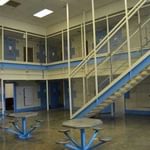
Amidst an ongoing lawsuit challenging the constitutionality of South Carolina’s death-row conditions, the state has moved its death-row prisoners to a different prison. On July 11, 2019, the South Carolina Department of Corrections (SCDOC) moved the state’s 38 death-row prisoners from Kirkland Correctional Institution to the nearby Broad River Correctional Institution (pictured), into a facility that had originally been built to house death-row prisoners in 1988. In a press release, SCDOC said the move “will address some of the concerns raised in a recent lawsuit filed on behalf of the Death Row inmates.”
One of the major issues raised in the prison-conditions lawsuit was the unnecessary harshness of the near-constant solitary confinement to which death-row prisoners were subjected. Those on death row were kept in small, windowless cells about the size of a parking space as much as 23 hours a day. The lawsuit charged that South Carolina’s death-row prisoners “are subjected to indefinite extreme isolation, devoid of mental stimulation, and have only sporadic human interaction.” At the new location, SCDOC said, prisoners will be given more opportunities to interact with one another, but will still be separated from the general prison population.
Corrections director Bryan Stirling said that state prison officials had visited death rows in North Carolina and Virginia to learn about conditions and practices in other states. Virginia recently improved its death-row conditions in response to a legal challenge similar to the one pending in South Carolina. A federal appeals court ruling in May 2019 by the U.S. Court of Appeals for the Fourth Circuit barred Virginia from returning to its earlier practice of keeping prisoners isolated 23 hours a day. The court — whose jurisdiction also includes South Carolina — cited “empirical evidence … that solitary confinement poses an objective risk of serious psychological and emotional harm to inmates, and therefore can violate the Eighth Amendment.”
The new policy in South Carolina will allow death-row prisoners to hold jobs within their prison unit, including “serving meals, cleaning the common areas, laundry or assisting fellow inmates with disabilities.” They will also be allowed to participate in communal worship services. Bob McAlister, a volunteer prison minister, said “it was impossible to have any kind of conversation” in the old facility, because he could only talk to prisoners through a slot in their door. “There was no meaningful way to establish relationships,” he said. “The only way I could talk to them was to literally shout. … It does no one any good to have complete isolation.”
John Monk, SC death row inmates in new (and nicer) home after quiet, high security move, The State, July 12, 2019; Press Release, South Carolina Department of Corrections, July 11, 2019.
South Carolina
Nov 01, 2024

Prisoners With Executions Dates in South Carolina and Idaho File Requests for Clemency
South Carolina
Aug 26, 2024

South Carolina Supreme Court Sets First Execution Date in More Than 13 Years
South Carolina
Nov 15, 2023
